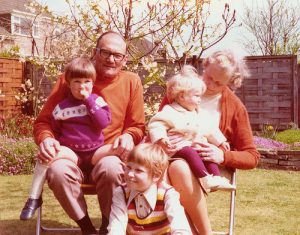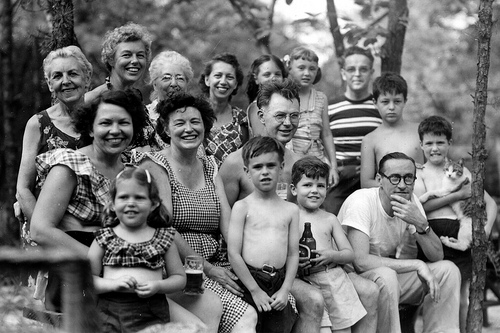Second Sunday after Pentecost Lectionary Reflection
June 10, 2012
Whoever does the will of God is my brother and sister and mother. Mark 3:25
Yes, everything is for your sake, so that grace, as it extends to more and more people, may increase thanksgiving, to the glory of God. 2 Corinthians 4:15
My mother’s family gathers for a reunion every year on the first weekend of June. This event, held in a central location within an hour’s drive of the “home place” serves an important function in the communal life of the Rogers family. Because the four generations are spread east to west from North Carolina to California and north to south from New York to Texas, this weekend affords the scattered family a time to reconnect, to update one another about life events and, most importantly, a time to retell treasured stories–to pass on the family legacy that is steeped in faith, history, and tradition. Of the original ten siblings only six are living, all of whom are over 75. We are a much less homogeneous bunch now, and our family borders are expanding geographically, socially, spiritually, and politically. This is a good thing. Yet in the midst of rapid change and graying hair, the annual reunion pilgrimage nourishes roots and strengthens ties that bind. Our plates heaped high with Southern delicacies, the air crackling with conversation, and smiles flashing for the camera, we are–at least for that weekend–one big hopeful and happy family.
 The lessons for the second Sunday after Pentecost have a thing or two to say about families and hope, and in this North American summer season of reunions and family vacations, perhaps this is a good time to revisit what it means to be Christian family. To understand where we stand today as Christian community, it would be helpful to recall the role of family in first century Palestine. The family unit was more than that entity into which an individual was born; it was security, it was standing, and it was deeply rooted in the concept of honor and shame. Family loyalty was keen, not just because people loved and cared for one another but more so because family needed one another to survive and even hope to thrive. To be cast out of the family unit (or to leave voluntarily) could mean economic hardship and even certain death. Widows and orphans were at chronic risk in that culture. The story of the prodigal son who squanders his birthright ponders that his fate would be more sure as a servant in his father’s household than out in the cruel, cold world on his own (Luke 15:11-32).
The lessons for the second Sunday after Pentecost have a thing or two to say about families and hope, and in this North American summer season of reunions and family vacations, perhaps this is a good time to revisit what it means to be Christian family. To understand where we stand today as Christian community, it would be helpful to recall the role of family in first century Palestine. The family unit was more than that entity into which an individual was born; it was security, it was standing, and it was deeply rooted in the concept of honor and shame. Family loyalty was keen, not just because people loved and cared for one another but more so because family needed one another to survive and even hope to thrive. To be cast out of the family unit (or to leave voluntarily) could mean economic hardship and even certain death. Widows and orphans were at chronic risk in that culture. The story of the prodigal son who squanders his birthright ponders that his fate would be more sure as a servant in his father’s household than out in the cruel, cold world on his own (Luke 15:11-32).
 In 21st century industrialized society, the family looks and functions differently. Even the definition of what constitutes family varies. According to the U.S. Census Bureau, in 2010 13.1 percent of households were headed by a single female, and 26.7 of households consisted of a single person. The number of husband-wife family households was down from 51.7 in 2000 to 48.4 in 2010. Census data also reveals that more than 25% of same sex couples are rearing children within their family unit. According to the Pew Research Center, 16.1% of the population lives in households where there are two or more generations of adults. The idea of mom and pop and 2.5 kids in a cul-de-sac split level is no longer the norm.
In 21st century industrialized society, the family looks and functions differently. Even the definition of what constitutes family varies. According to the U.S. Census Bureau, in 2010 13.1 percent of households were headed by a single female, and 26.7 of households consisted of a single person. The number of husband-wife family households was down from 51.7 in 2000 to 48.4 in 2010. Census data also reveals that more than 25% of same sex couples are rearing children within their family unit. According to the Pew Research Center, 16.1% of the population lives in households where there are two or more generations of adults. The idea of mom and pop and 2.5 kids in a cul-de-sac split level is no longer the norm.
Think about the families within your faith community. Are grandparents rearing grandchildren? Are gay and lesbian couples bringing their children for baptism? How many couples in premarital counseling are already cohabiting? What percentage of recent college grads have moved back in with their parents? How many 20-somethings are sharing housing with a more intentional sense of community? How is your faith community responding to these realities with a sense of welcome and inclusiveness?
 Jesus draws a wide circle of inclusion with his description of who constitutes his family in this week’s gospel lesson. Whoever does the will of God makes the cut. No wonder his flesh and blood kin were wondering about his mental state. This was radical stuff indeed.
Jesus draws a wide circle of inclusion with his description of who constitutes his family in this week’s gospel lesson. Whoever does the will of God makes the cut. No wonder his flesh and blood kin were wondering about his mental state. This was radical stuff indeed.
So, dear friends, what sort of Christian “family reunion” might take place in your context? Does everyone look the same, act the same, and think the same? Is there room for that wacky aunt or “artistic” cousin from the big city? Who is welcome at the table? Will we, like Paul, support that wide-arcing grace that spreads outward from Christ’s love to the ends of the earth? It seems to me that our families of faith have to look different if we are to follow Jesus’ example. We need to have that “family reunion” spirit at every single worship service and any time the body of Christ is gathered and sent. Room for all, love for all, and space for all–this is not an impossible dream. This is one big, hopeful family called church.
The question for our congregations and faith communities is how will we live into this family reality? Will we be able to move beyond outdated models and ways of being family so that new family members feel included? How do we best continue to share the stories and ties that bind while still welcoming new voices? Is this our grandparents’ church, our children’s church, or a church family for all generations? I can’t speak for your particular context and location, but you can. What I do know is that we’d better start asking the questions and engaging in the conversation. Blessings on your preaching and teaching.
Photos by dsearls, edbrambley, foilman, and johnragai used under Creative Commons License. Thanks!




Just curious … where the heck is Lower Susquehanna Synod? I’m not from the US. Thanks.
Blessings,
Evelyn McLachlan >
King City United Church
King City, Ontario, Canada
(just north of Toronto)
Hi, Evelyn. Sorry! The Lower Susquehanna Synod of the Evangelical Lutheran Church in America is in south central Pennsylvania. http://www.lss-elca.org/